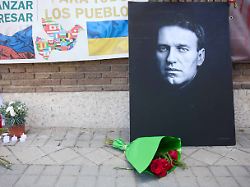Died in a prison camp
Dozens of countries are calling for an investigation into Navalny’s death
March 4, 2024, 5:43 p.m
Listen to article
This audio version was artificially generated. More info | Send feedback
Russian authorities insist on their claim that Kremlin critic Navalny died of “natural causes”. 43 countries on the UN Human Rights Council doubt this claim. They want an “independent and transparent” investigation into how Navalny died.
After the death of prominent Kremlin critic Alexei Navalny in a Russian prison camp, more than 40 countries have called for an independent international investigation. Russia must allow an “independent and transparent international investigation into his sudden death,” said EU Ambassador Lotte Knudsen on behalf of 43 states to the UN Human Rights Council. According to Russian authorities, 47-year-old Navalny died on February 16 in a Russian prison camp in the Arctic, where he was serving a 19-year prison sentence.
According to Russian information, Navalny died of “natural causes,” although the exact circumstances remain unclear. His supporters and numerous Western politicians blame the Russian leadership and Kremlin boss Vladimir Putin for the death of the opposition figure. Moscow rejects the allegations.
After Navalny’s death, the authorities refused to hand over the body to his relatives for eight days. They suspected this was an attempt to cover up the authorities’ involvement in his death. Navalny was finally buried in Moscow on Friday, and numerous supporters flocked to the ceremony despite warnings from the authorities.
On the day of Navalny’s funeral, there were mourning events across the country, and dozens of people were arrested. The civil rights portal ovd.info reported on Sunday morning that the number of arrests was 105, spread across 22 cities, including around 20 people in Novosibirsk alone.
Last weekend, despite the police presence, people continued to say goodbye to Navalny at his grave in the Borisovskoye cemetery. Uniformed police and National Guard personnel as well as cemetery employees allowed mourners to linger at the grave unhindered and lay flowers.
